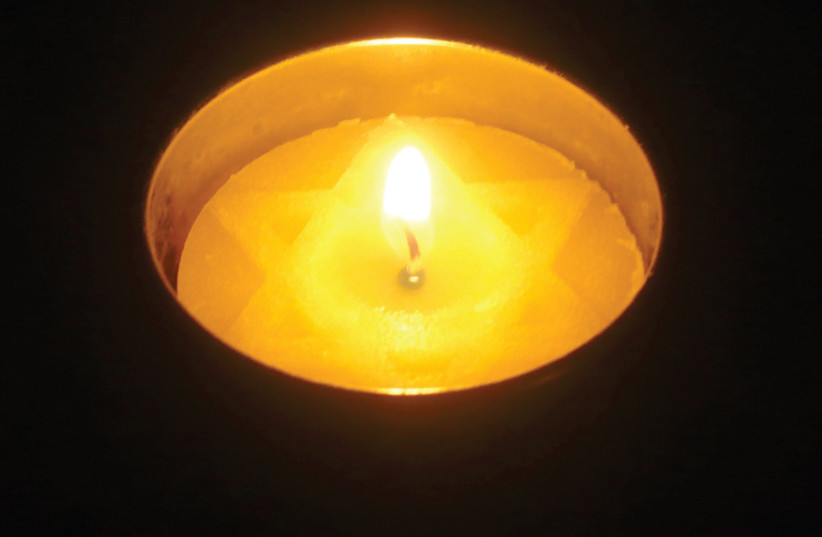My first thought when I read the title of this book A Daughter’s Kaddish was to wonder what the author could add to the array of memoirs that other Jews have written about their experiences saying Kaddish for a parent.
Birnbach’s memoir, heavily based on the extensive journaling she did in the 11 months following her father’s death, was published 22 years after he passed away, almost to the day. The contrasting way Birnbach characterizes her father and mother is a core theme running through the memoir and makes the reader suspect that this story could not have been published before her mother’s death.
Her father, Marvin, is portrayed as the Old Spice-wearing, ever-devoted, loving, heroic, fun and perpetually self-sacrificing parent. Her mother, on the other hand, is depicted as a cold, cruel and narcissistic woman who, on at least one occasion, physically abused her young daughter and then openly lied about it in her presence. The passages about her mother’s emotional abuse, which extend deep into Birnbach’s adult years, make for painful reading.
In the Epilogue, Birnbach shared that she became her mother’s primary caretaker in 2018, when her mother moved to an assisted living facility two blocks from her Maryland home. There she confirmed that her mother’s death coincided with the submission of the manuscript to her publisher.
Interestingly, Birnbach never addresses the question of how her revered and righteous father could remain, apparently contentedly, married to her deeply flawed mother for 54 years, but she does report a softening in the mother-daughter dynamic in her mother’s final years.

Going beyond the parental dynamic
Beyond the parental dynamic, the book centers on Birnbach’s experience reciting Kaddish for her father. Despite his request many years previously that Birnbach hire a Jewish man to recite Kaddish for him upon his death, she decided to take that responsibility upon her own shoulders.
For Orthodox men, the commitment to recite Kaddish with a minyan multiple times a day for 11 months can be logistically challenging. For Birnbach, who lives in the United States and identifies as a feminist Conservative Jew, undertaking the commitment to recite Kaddish with a minyan twice a day is impressive. To have made this commitment 22 years ago was herculean.
WORKING IN her favor was the access she had to a regular daily minyan in an egalitarian synagogue near her home. At the same time, her commitment was complicated by the frequent work-related travel she undertook in 2000-01. These trips also led to the three most touching episodes in the book – times when ad-hoc minyanim were assembled expressly for her.
Once, while teaching a week-long summer seminar at the University of Delaware, only three Jews responded to her plea for a minyan with which she could recite Kaddish. To fill the gap, a small group of Christian men and women joined her temporary prayer community, an experience she called “the most inspirational moment of these past ten months.”
Not every out-of-town attempt to fulfill her Kaddish commitment was as positive. More than once, Birnbach was rebuffed by Orthodox gatekeepers for whom, in 2000-01, a woman asking to recite Kaddish was largely unheard of. In that respect, A Daughter’s Kaddish is most reminiscent of Mornings and Mourning: A Kaddish Journal by E.M. Broner, published in 1994. Both memoirs highlight the frustration of a woman trying to say Kaddish in a world where that wasn’t (yet) done.
Although A Daughter’s Kaddish is significantly more about the Jewish community and Jewish communal prayer than it is about God, Birnbach does occasionally reflect on her desire for God to accept her efforts, however flawed, to elevate her father’s soul.
Throughout the memoir, Birnbach revels in the chance to explain her understanding of Judaism to the non-Jews that she encounters, and she writes appreciatively about their interest in and respect for Jewish tradition.
A portion of the memoir is didactic, clearly an attempt to explain the cultural and religious background she suspects her readers might need. She also makes an important sociological point when she writes, “It is hard, in 21st-century America, to make grieving a priority.”
There are a few glaring things Birnbach gets wrong. She declares that Sukkot, one of the three major biblical festivals, is considered a minor Jewish holiday, and she confidently asserts that Orthodox women are never seen in slacks and never wear red. While these misrepresentations are not surprising, given her American Conservative perspective, I found them irksome.
These flaws aside, the memoir is an accessible, congenial read. It will resonate most with those familiar with the world of the non-Orthodox American Jewish synagogue.
For those interested in the topic, Kaddish: Women’s Voices edited by Michal Smart and Barbara Ashkenas (2013) and My Year of Kaddish: Mourning, Meaning and Memory by Naomi L. Baum (2020) cover similar ground.
A Daughter’s Kaddish
By Sarah Birnbach
Wonderwell
304 pages; $17.45
